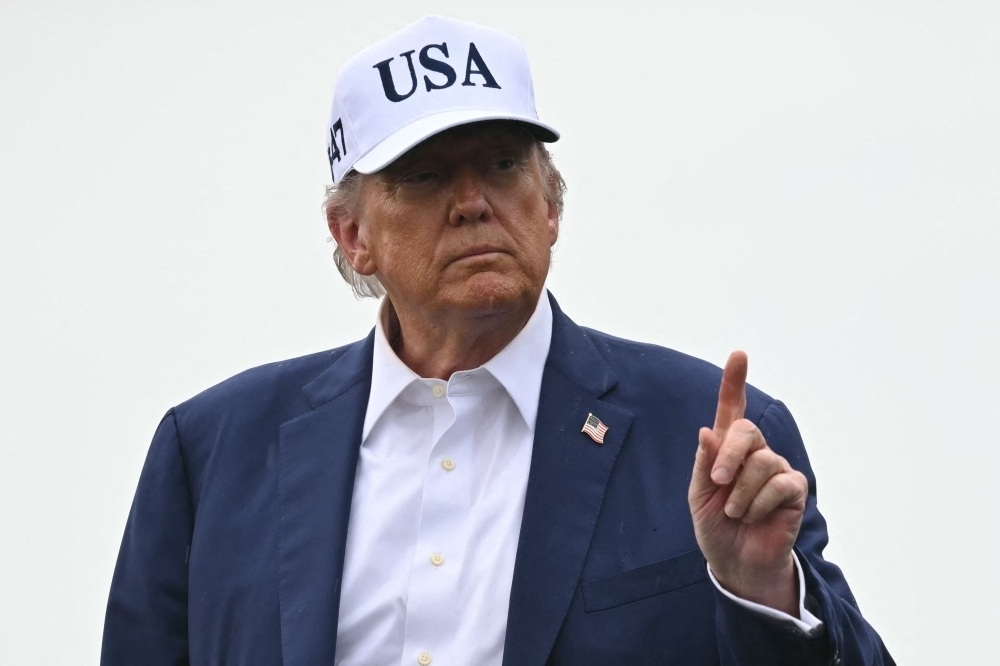President Donald Trump announced that his administration will begin issuing formal notifications to U.S. trade partners on Monday, informing them of upcoming tariff changes.
The move, aimed at clarifying the future of U.S. trade relations, comes amid growing uncertainty about the timing and scope of the new tariff structure.
“We’ll be sending out maybe 12 to 15 letters,” Trump said to reporters, adding that several agreements have already been reached with certain nations.
“It’ll be a mix—some letters, some deals,” he explained.
Trump’s earlier plan included a 90-day suspension on newly announced tariffs, a period that ends on July 9.
As the deadline approached, confusion mounted over whether the new tariffs would kick in immediately or be delayed until August 1, as hinted by some administration officials.
When questioned, Trump initially struggled to provide a clear timeline.
“They’re going to be tariffs, the tariffs… I think most countries will be sorted by July 9,” he said ambiguously.
To clarify, Commerce Secretary Howard Lutnick intervened, confirming that while letters and agreements are being finalized now, the tariffs will officially come into effect on August 1.
Back in April, Trump introduced a baseline tariff of 10% on most countries, with some duties potentially reaching as high as 50%.
He later postponed implementation for most tariffs, except the 10% base rate, until July 9.
The new August 1 enforcement date gives trade partners an additional three weeks, but it also extends uncertainty for importers and businesses.
The lack of clear communication has already rattled global financial markets. Asian equities opened lower on Monday, with Japan’s Nikkei index slipping 0.3% and South Korea’s market falling 0.7%.
The broader MSCI index of Asia-Pacific shares, excluding Japan, dropped by 0.1%.
In Europe, markets saw mixed results. The UK’s FTSE 100 declined by 0.3%, largely influenced by drops in major energy firms like BP and Shell due to weakening oil prices.
Meanwhile, Germany’s DAX posted a modest 0.3% gain, and France’s CAC 40 remained nearly flat.
The Stoxx Europe 600 index, tracking top European firms, also showed minimal movement.
Commodity markets mirrored the uncertainty.
Copper prices on the London Metal Exchange fell 0.6% to $9,808 per tonne, while aluminum dropped 1.1% to $2,561.
All major industrial metals traded lower during the session.
Trump reiterated his position in a post on his social media platform, Truth Social, stating that “TARIFF Letters, and/or Deals” would begin rolling out at noon on Monday.
BRICSHe also issued a warning: countries that align with the BRICS bloc – Brazil, Russia, India, China, and South Africa – would face an additional 10% tariff with no exceptions.
This statement comes just a day after BRICS leaders, meeting in Brazil, expressed concern over the rise in unilateral trade measures like tariffs.
In a joint declaration, they warned that such practices could negatively impact the global economy.
Responding to Trump’s tariff threats, Chinese foreign ministry spokesperson Mao Ning criticized the use of trade barriers as leverage.
Ning said tariffs serve no productive purpose and harm international relations.
Meanwhile, U.S. Treasury Secretary Scott Bessent told CNN that a flurry of new trade agreements could be announced in the coming days.
He noted progress in talks with the European Union and said Trump plans to notify around 100 smaller countries.
According to him, many of these countries have minimal trade with the U.S., that they could revert to tariff levels first proposed on April 2 if no agreements are reached by August 1.
“Letters will go out making it clear: move forward with negotiations or face the original tariff rates from April,” Bessent explained.
He expressed optimism that this approach would prompt quick deals.
Since returning to office, Trump has reignited global trade tensions, sparking volatility in markets and forcing governments to renegotiate trade terms with Washington.
Bessent revealed that negotiations are underway with up to 18 key partners, though only two deals—one with the UK and another with Vietnam, have been finalized since April.
Indonesia is reportedly close to sealing a deal to import at least one million tons of U.S. wheat annually over the next five years.
The agreement, shared by Indonesia’s flour mills association, is seen as a strategic move to shield the country from steep tariffs as it continues talks with both the U.S. and the EU.



